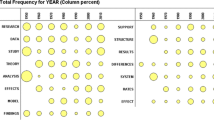Conclusions
Reflecting onMoravcsik's paper and his assertion that a damaging dominant one-dimensionalism prevails within the science of science, one can draw the following conclusions. Firstly, the one-dimensionalism described byMoravcsik is a misrepresentation of a great deal of useful and valid “scientometric” research. This work is not so methodologically or theoretically naive asMoravcsik seeks to suggest, nor is it so uniform. Secondly,Moravcsik's assertion that there is little multidimensional work being carried out overlooks the considerable body of such research being published in the sociology of science. Thirdly, the sociology of science is but one sub-field of the science of science, and each such sub-field is characterized by its own sets of objectives and resource constraints. The nature of these objectives and constraints determines the relative suitability of particular methodologies and the optimal mix of methodologies. This in turn influences the relative frequency of adoption of those approaches which can be described as either “one-” or multidimensional. The result is that contrary to Moravcsik's assertions, a methodological pluralism already exists; a methodological pluralism which should be recognised as a natural consequence of the diversity of research objectives and constraints which characterize the science of science, as well as the wide range of disciplinary backgrounds of those who work within it.
As the science of science has itself shown, discussion of cognitive content should not be totally divorced from consideration of social context.
Similar content being viewed by others
References
M. J. MORAVCSIK, Life in a multidimensional world.Scientometrics, 6 (1984) 75.
F. R. JEVONS,Science Observed: Science as a Social and Intellectual Activity, Allen and Unwin, London, 1973.
R. D. WHITLEY, Black boxism and the sociology of science,Sociological Review Monograph 18 (1972) 66–92.
See, for example, K. D. KNORR, R. KRON, R. WHITLEY (Eds),The Social Processes of Scientific Investigation, Sociology of Science Yearbook Vol. 4 (1980), Reidel, Dordrecht, 1981; and H. M. COLLINS (Ed.), Knowledge and Controversy: Studies in Modern Natural Science, special issue ofSocial Studies in Science 2 (1981) 1.
The two collections under note 4 have been referred to, respectively, as the “constructivist” and “relativist” programmes.
H. GARFINKEL,Studies in Ethnomethodology, Prentice Hall, Englewood Cliffs, New Jersey, 1967.
B. G. GLASER and A. L. STRAUSS,The Discovery of Grounded Theory, Weidenfeld and Nicholson, London, 1968.
K. R. POPPER,The Logic of Scientific Discovery, Hutchinson, London, 1959; andConjectures and Refutations, Routeledge and Kegan Paul, London, 1963.
P. M. BLAU,Exchange and Power in Social Life, John Wiley and Sons, New York, 1964.
W. O. HAGSTROM,The Scientific Community, Basic Books, New York, 1965.
Discussion of such a strategy appears in: D. EDGE, Quantitative measures of communication in science: a critical review:History of Science 12 (1979) 102–134.
See, for example, papers inSocial Studies of Science 7 (1977) No. 2.
D. EDGE, Why I am not a co-citationist,Society for Social Studies of Science Newsletter 2 (1977) 13–19.
Usually, but not always: see, for example M. KOGAN, N. KORMAN and M. HENKEL,Government's Commissioning of Research: a case study, Department of Government, Brunel University, Middx., 1980.
Author information
Authors and Affiliations
Rights and permissions
About this article
Cite this article
Gordon, M.D. Methodological pluralism in a multidimensional world. Scientometrics 6, 87–92 (1984). https://doi.org/10.1007/BF02021281
Received:
Issue Date:
DOI: https://doi.org/10.1007/BF02021281




